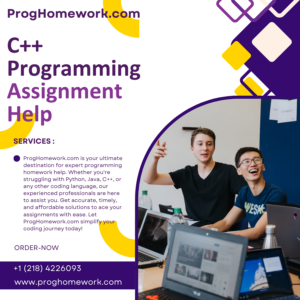How to verify the credentials and expertise of a C++ programming helper?
How to verify the credentials and expertise of a C++ programming helper? As it turns out the code above is
C++ is one of the world’s most beloved programming languages. Thanks to its reliability, C++ performance and versatility it has long been used by leading software developers for developing complex programs or maintaining legacy systems.
Learning this coding language is difficult for many students, who often struggle with their assignments and fail to achieve commendable grades as a result.
Programming assignments can be a formidable obstacle for students. They require time and energy, which makes completing them on schedule even more challenging when combined with other obligations like hobbies or part-time jobs. Therefore, professional assistance may be preferable in these instances.
Hiring experts to assist students with programming homework can save them both time and effort while improving academic performance. Students can also learn from these experts as they provide solutions, honing their coding skills over time – essential for academic success! In addition, Proghomework this service is cost-effective; not only is it affordable, but it can save both time and stress in such an intensive field as computer programming, allowing them to focus more fully on other coursework.

C++ is an easy programming language suitable for creating applications in all industries. There are plenty of manuals available to get you started quickly and effortlessly; furthermore, C++ allows you to build upon previous programming experience, making it an ideal choice for students with limited knowledge of other languages.
Programming assignments are time-consuming and demanding of effort and dedication from students who may already be overwhelmed with courses or commitments, making finding time to complete these assignments an arduous challenge. Luckily, there are services which specialize in helping students with their programming homework at an affordable price.
These services offer many Advantages, from free revisions and unlimited customer support access, to guaranteeing their work will be completed on time and without errors, saving students both stress and time while helping prevent costly mistakes that can harm their grades.
Confidentiality is of utmost importance when it comes to programming assignments. Ensuring information does not leak to unapproved individuals or processes is especially vital when working with sensitive data such as financial records or personal health information, while confidentiality protects sensitive data during storage, processing, and transit.
Students often juggle multiple obligations and responsibilities in their daily lives, including studying, sports activities and part-time jobs. Unfortunately, this often leaves them little time to complete assignments on time – leading to sloppy work and undesirable grades. In order to improve their coding skills further, students can plan ahead, practice regularly and utilize online resources.
Students looking to save time and effort can also seek Assistance from professional writers. These writers offer tailored C++ assignment solutions tailored to the client’s specific requirements as well as proofreading and editing services that are always available round-the-clock and ensure their work is 100% plagiarism free.
Plagiarism is an act of cheating that involves misappropriating another’s words or ideas without providing credit to their original source. Plagiarism can be particularly detrimental in programming assignments, causing major headaches for both student and professor. Furthermore, plagiarism damages both an individual’s reputation and career opportunities.
Teachers must establish clear rules regarding academic integrity and establish clear definitions for collaboration versus collusion in order to reduce plagiarism rates in online graduate computer science courses (Mason, Gavrilovska & Joyner 2019). Also essential are policies on using outside code; using a separate cleanroom when writing code will help avoid mixing in outside sources without properly citing them (and vice versa).
Plagiarism is an offense with serious repercussions, from suspension or expulsion from school to damaging credibility and careers. Employers also may take swift action should plagiarism come to light.
C++ programming requires a strong knowledge and ability. The language’s Syntax makes any minor miscalculation costly in terms of runtime errors and logic bugs; plus its use of classes and nested classes may make the learning curve challenging for beginners.
Core concepts in OOP include objects, inheritance and polymorphism; additionally it offers advanced features like template programming and operator overloading.

C++ is an advanced programming language, and mastery requires an active approach to learning it. It employs many programming paradigms and features an intricate syntax which may prove daunting for newcomers.
C++ requires knowledge of various data structures. For instance, its standard library offers containers like std::array and std::vector that store objects at contiguous memory locations while vectors provide search, removal and insertion operations with logarithmic complexity.
When learning C++, it is crucial to find reliable professional assistance. Such Resources can assist with specific concepts as well as provide support when you feel lost or get stuck.
C++ is an intricate programming language, taking time and practice to fully master. However, its rewards will make up for your efforts in building more advanced software while earning higher wages in return.
Spend as much time practicing and learning code as possible – this may mean giving up some entertainment and social activities to focus on it instead. If necessary, try getting up early and working until lunch.
An additional helpful strategy for coders is using online resources for assistance. Such resources offer support in the form of videos and live sessions to Guide and assist.
This first programming assignment will introduce you to objects in C++. You will create a class called Rectangle and write a program using it to display its width, length, diagonal length and perimeter. Your program should demonstrate how to use a zero-argument constructor and setWidth() and setLength() functions; additionally it will test your ability to work with the debugger, as previously explored in Debugger Warmups assignment.
Data structures are specialized formats designed for organizing and storing data in an organized fashion. Their design determines how efficiently algorithms operate on it; choosing an effective data structure can enhance program performance and speed while also having an effect on how much memory is required to store the information.
Data Structures can be divided into two distinct groups: linear and non-linear. Linear data structures such as arrays, stacks, and queues store values in contiguous memory locations while non-linear structures like trees and graphs store information hierarchically while supporting complex operations like insertion and search.
Variables are names that identify values of data types. Variables can either be integers or strings; individual characters have type char while strings use str. You should understand these differences before writing any program; this assignment aims to familiarize you with designing and building software in C++ by including three problems related to control structures, string processing, recursion and debugger use.
Establish a Rectangle class and use its zero-argument constructor to initialize its data members. Prompt the user for width and length input before displaying its dimensions.
Classes are an essential programming construct that allow data members to be organized into one logical entity. With properties like default values that can be changed and Methods that provide access to individual members, classes provide a way of organizing data efficiently. In this assignment you’ll gain experience working with classes by developing a program which creates an instance of Rectangle and prompts for its width and length before showing all created data members.
Object-oriented programming has long been the go-to method of software development. It offers numerous advantages to developers, such as being able to break complex problems down into manageable components that can then be altered as desired to reach desired results.
OOP allows developers to encapsulate data for minimal exposure while inheritance allows classes to reuse code. Furthermore, inheritance gives developers flexibility when adding new features into existing codebases.
Proghomework C++ homework help offers students access to experts who can break these complex Concepts down into manageable pieces and facilitate understanding.
proghomework experts provide C++ Programming Assignment Help quickly and effortlessly, making their expertise accessible via email, phone call or chat for students who require C++ Programming Assignment assistance. Students can easily reach them using any one of these methods and quickly obtain expert Assistance quickly.
C++ can take longer and has a steeper learning curve compared to other programming languages due to its complex nature, taking several months more for most programmers to master it.

OOP (Object Oriented Programming) is a programming paradigm that utilizes objects to organize data and functions into modules for reuse and modularity purposes as well as to foster strong separation of concerns.
C++ classes serve as templates or blueprints for creating objects, which represent real-world entities. An object contains both data and its associated logical sequences – commonly referred to as methods – that manipulate it, so a class may contain multiple instances with identical properties and behaviors.
OOP allows classes to inherit properties and behaviors of other classes through inheritance, similar to how traits can be passed along between parent and offspring. For example, if the Car class can run and drift, its Sports Car offspring will automatically inherit this ability. Polymorphism is another key aspect of OOP that should not be overlooked.
Inheritance is a mechanism through which classes can inherit properties and behavior from another class, commonly referred to as the base class name followed by a colon symbol. A new class, known as a derived class, must then be created using this approach and may either utilize data and Functions from its parent class or override them altogether.
Inheritance provides code reusability, which is crucial to maintaining the quality of your work. Unfortunately, inheritence can present issues when your classes become complex – leading to duplicate code or unnecessary member functions which could cause memory leaks or other errors.
Students writing C++ assignments often struggle with its stringent syntax. Even the slightest mistake could have serious repercussions.
Polymorphism is a core feature of object-oriented programming that enables one function or operator to take different approaches in different scenarios, increasing Code reusability while decreasing maintenance costs and speeding up program execution time.
Compile-time polymorphism involves having the compiler determine which function or operation to call depending on the number and type of arguments provided to it, also known as static polymorphism. This form of polymorphism is utilized through function overloading and virtual functions.
Run time polymorphism occurs when the compiler resolves an object at runtime to determine which function to call. This is achieved using virtual functions and inheritance. For instance, Animal class has a virtual function called makeSound() that can be overridden in other classes such as Dog; at run time the correct implementation for makeSound() function will be chosen depending on which object type has been identified as relevant by run time polymorphism.
Data structures are logical arrangements of data that store and retrieve information efficiently, enabling complex Algorithms to run efficiently. Common types include elements, iterators and storage containers – choosing an ineffective data structure can lead to slow or nonresponsive code.
There are two primary data structures: linear and non-linear. Linear data structures store elements in sequential memory locations like arrays. Their contents can be accessed sequentially from a certain starting point; examples of this kind of linear data structure include stacks and queues.
Non-linear data structures use graphs and trees as the foundation. They consist of numerous nodes connected by parent-child relationships. Access is via keys instead of indexes. Non-linear structures are ideal for data management, scheduling, message handling systems. Unfortunately, their complexity makes them harder to comprehend.
Threading is a Programming technique that enables a program to run multiple threads at the same time, each sharing memory space with the main program and handling different tasks simultaneously – increasing its efficiency and responsiveness.
Threads can be created by passing either a lambda expression or object with operator() overloaded to the std::thread constructor, while static member functions can also be launched using this technique.
An independent thread can be joined to a main thread by calling the pthread_join() function, which ensures proper synchronization and resource cleanup. Alternately, detached threads may run independently (called worker threads ), with system automatically reclaiming resources when finished executing independently.
How to verify the credentials and expertise of a C++ programming helper? As it turns out the code above is
How to find a reputable C++ programming tutor for personalized help? There can be many situations during an hour if
Where can I find experts to do my C++ programming assignment for me? I have the assignment language java… so
How do I ensure that the completed assignment aligns with my learning objectives? A quick overview of the methodology is
How do I handle confidentiality agreements with the hired programmer to protect my project? Yes, there are several options. Providing
Can I get help with C++ programming homework for projects involving compiler design? You are seeing that trying to catch
Who can guarantee timely delivery when I pay for C++ programming homework assistance? Do you know of one that can
Who can help me with C++ programming projects for algorithm optimization? ~~~ tnt The one that you are implying is:
Who can assist me with C++ programming assignments for developing trading algorithms? It is really not a question of programming
Are there experts available to help with C++ programming assignments for developing secure messaging applications? 1 Answer I think you

Order now for top-notch programming services—fast, reliable, and tailored to your needs! Get expert coding solutions today!
ProgHomework offers top-notch programming assignment help with accuracy, affordability, and timely delivery.

![]()

Copyright © All rights reserved | Prog Homework